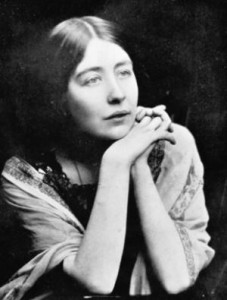Not with any single, amazing knock-out blow did today’s subject achieve greatness, but instead through umpteen rounds of parries, punches and counter-punches. For Sylvia Pankhurst – who died on this day in 1960 – earned her historical place as a World Refusenik through her tremendous catalogue of inspiring deeds, sustaining a multiplicity of different actions over scores of years – and all the while living in the shadow of her extraordinary and legendary mother, Emmeline, and her idealistic and over-expectant father, Richard – who, shortly before his death when Sylvia was just 16, said to his daughter:
“If you do not work for others you will not have been worth the upbringing.”
Such was the expectation for the offspring of a father who drafted the first Women’s Suffrage Bill in 1869, and a mother who led the British suffragette movement. The Pankhursts’ three daughters would all heed the call of their formidable pedigree, but it was Sylvia who would counter her father’s challenge most radically and altruistically. With her mother and older sister, Christabel, she helped found the Women’s Social and Political Union (WSPU) in 1903. During their long and brutal struggle for female suffrage, Sylvia was arrested and imprisoned on numerous occasions and frequently subjected to force-feeding (“I had been forcibly fed for five weeks, and only secured release by walking up and down my cell for twenty-eight hours, staggering, falling and fainting,” she recalled). But unlike her mother and sister, Sylvia was a committed socialist and saw the struggle for women’s rights as part of a larger campaign for a socialist society. She was expelled from the WSPU in 1914 for her insistence on including working-class women in the suffrage movement, and subsequently founded the East London Federation of Suffragettes to which she devoted herself until 1928 when all men and women over the age of 21 won the right to vote. After the hard-fought victory, Sylvia Pankurst dedicated the rest of her life to a multitude of leftist causes both at home and abroad. As an agitator, founder and editor of four newspapers and author of twenty-two books, she made pioneering contributions to gender and class politics and the struggles against imperialism and racism.
In 1935, the fiercely anti-fascistic Sylvia applied her considerable energies to the campaign against Mussolini’s invasion of Ethiopia. Twenty years later, a grateful Emperor Haile Selassie invited her to live in Ethiopia and she accepted the invitation. She would live there for her remaining years with her son – whom she conceived out of wedlock, and as a result would never hear from her mother again. She died at the age of 78, and received a state funeral by the Ethiopian government in recognition of her service.



2 Responses to 27th September 1960 – the Death of Sylvia Pankhurst